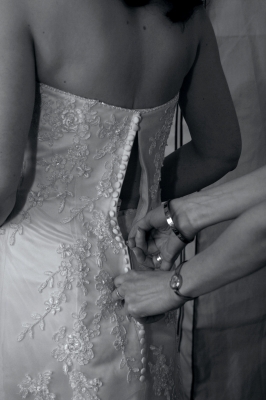
Wedding etiquette for the couple’s parents used to be quite simple: the groom’s family paid for the rehearsal dinner and honeymoon, while the bride’s paid for the wedding and reception. Today, anything goes.
Because couples seem to choose to get married a bit later in life, the brides and grooms are usually more independent and able to pay a bigger portion of the wedding costs. In turn, they have more say on how the wedding will go, who gets to come and where they will be seated.
As this may be more exciting and fulfilling for the bride and groom, the parent’s roles in the wedding preparation can become quite a gray area. So what are the rules for the parents?
Wedding Etiquette for Parents
Here’s what you need to remember: etiquettes revolve around the principles of respect, honesty, sensitivity and consideration. Remember that while traditions are fluid, these principles never change. With these principles in mind, here are some do’s and don’ts for the parents.

Wedding Do’s
- Do tell your child and child in-law to be how much money you have available to help with the wedding. This will help them adjust their expectations and prepare accordingly.
- Do make an effort to meet the other parents (of the bride or the groom). Include them in the planning and pre wedding activities. The groom’s parents – especially his mom – usually feel left out. Remember that that other set of parents will be your child’s future parents-in law and you will likely be sharing many things with them after the wedding, so getting to know them and trying to get along now will help everyone involved.
- Do take fashion cues from the bride, especially in terms of designs and colors. This goes for both mothers. While the mother of the bride typically gets to choose her dress first, it is important that both she and the mother of the groom blend well with the brides fashion choices. It will be also be a good idea to shop together.
- If you belong to a blended family and there are stepparents attending, do agree to take turns in the receiving line or other roles at the wedding.
- Do communicate. Talk to your son or daughter throughout the planning stage of the wedding and discuss your expectations as well as theirs. This can be about money, seating arrangements, guest lists, etc. It is easier to iron out everything early on than come to the wedding unprepared.
Wedding Don’ts
- Don’t expect anything back from your financial support. Don’t attach strings there. Your contribution is about the love and support you are giving your child and his or her new partner, not about having a say on the venue, the guest list or the seating arrangements. Make suggestions, but remember that at the end of the day it is their wedding, not yours and their wishes should be followed.
- Don’t bring emotional issues or other personal grievances to the table. No wedding is perfect, and this is the time when emotions run high because of stress. You will likely run into someone you don’t like, your ex-husband’s new wife or the bridesmaid with a horrible tattoo on her shoulder. Don’t add stress to the couple by making them worry about whether you will erupt into an argument with someone at the wedding.
- Don’t get easily offended. As wedding traditions continually change, certain things you may have been used to may be practiced in a completely different way today. For example, some couples choose not to mention their parents in the invitation especially if they have a blended family: i.e. “Mark and Anne, along with their families, invite you to…” This way, they can accommodate their untraditional families.
- Don’t throw a fit if you don’t get things your way. Remember that this is a special day for your child, and you want them to have good memories of it.
Just remember that regardless of how your children want to do their wedding, it is important that you are part of it. Enjoy the big day and the days leading to it with the rest of your family.



Speak Your Mind